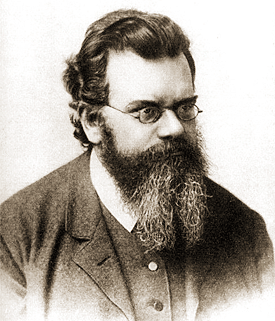Ludwig Boltzmann
Ludwig Boltzmann was a renowned physicist born in Austria on
February 20, 1844. He devoted his life to theories and education
with regard to physics. He studied with many great names while
attending the University of Vienna.
 Ludwig Boltzmann
Ludwig Boltzmann |
|
Among them was Joseph Stefan, who later became Boltzmann's mentor
and friend. In addition to helping Boltzmann with his doctoral
degree, Stefan played an important role in his continuing career,
getting him work at the University of Graz as the Professor of
Mathematical Physics. Boltzmann's personal life was filled with
his wife and five children.
Henriette von Aigentler, the woman who would become Boltzmann's
wife, shared his love of learning and teaching. They met while
she was petitioning to attend classes as a guest since women were
not allowed as university students in Austria at the time. She
was encouraged to keep trying by Boltzmann.
She eventually won her case and Boltzmann. They were married
four years after they met, producing five children. Henriette
bore two sons and three daughters. Meanwhile, Boltzmann continued
to advance among his colleagues. The family moved every few years,
giving Boltzmann many opportunities professionally.
In his lifetime, Boltzmann had many who disagreed with him. Wilhelm
Ostwald was one. Ernst Mach was another. The difference between
the two was that Ostwald and Boltzmann only disagreed professionally,
whereas Mach was considered a personal foe of Boltzmann in addition
to being one professionally. Boltzmann left Vienna in 1900 to
avoid working with Mach any further and went to Leipzig to work
with Ostwald instead.
During these latter parts of Boltzmann's life, his theories were
being consistently questioned, giving him the job of defending
his work. Boltzmann returned to Vienna after Mach's health forced
him to quit teaching. Once there, Boltzmann took over his prior
subject of physics and branched out to include Mach's former classes
in philosophy, becoming a popular lecturer on the subject.
Boltzmann's professional achievements included memberships in
the Imperial Austrian Academy of Sciences and the Royal Swedish
Academy of Sciences and presidency of the University of Graz.
He held professorships at multiple universities with great prestige,
including Munich, Vienna, Berlin, and Heidelberg. He is one of
the three men responsible for creating the Austrian Mathematical
Society.
Perhaps Boltzmann's greatest professional achievement was the
development of statistical mechanics. He was the first to systematically
describe the thermodynamic properties of atoms in relation to
macroscopic materials.
Though it is often said that Boltzmann was well-respected among
his colleagues, it is also thought that he felt their criticisms
too strongly. Boltzmann was a lifetime sufferer of depression,
with mood swings that may have contributed to both his brilliance
and his somewhat nomadic career preferences.
The end of Boltzmann's long and significant career came to a
sad and decisive end on September 5, 1906, when it was discovered
that he had hanged himself. Even more sadly is the fact that Boltzmann
ended his life just shortly before experimentation proved that
his theories were not all ideas. He had a history of suicide attempts
and many have thought that this time it was his belief in the
lack of agreement with his theories that drove Ludwig Boltzmann
to successfully take his own life while visiting the beach with
Henriette and one of his daughters.
Rumor Has It …
Ludwig Boltzmann liked to dance the Cha cha cha with his cat
named Fred while balancing a ping pong ball on his nose. True
story. Almost.
Written by Kevin Lepton
|

